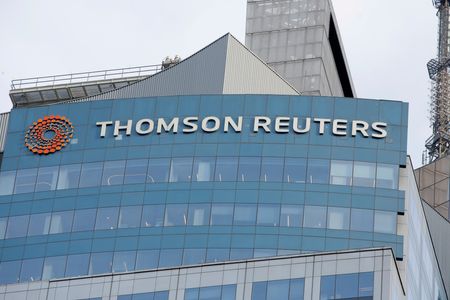 1
1 1
1
By Helen Coster and Kenneth Li
NEW YORK (Reuters) -Thomson Reuters Corp on Tuesday reported higher-than-expected sales and operating profit in the first quarter, helped by divestitures and high customer retention rates, as it plans a deeper investment in artificial intelligence.
The news and information company reported adjusted earnings of 82 cents per share, beating analyst forecasts for 80 cents.
Total revenue rose 4% in the quarter to $1.738 billion, beating expectations, according to estimates from Refinitiv.
Thomson Reuters, which owns the Westlaw legal database, Reuters news agency and the Checkpoint tax and accounting service, said organic revenue was up 7% for its “Big 3” segments: Legal Professionals, Corporates and Tax & Accounting Professionals.
“While we acknowledge elevated macroeconomic uncertainty, our underlying business is resilient,” Chief Executive Steve Hasker said in a statement.
Thomson Reuters reaffirmed most 2023 financial estimates, but trimmed its full-year total revenue growth forecast to 3% to 3.5%, from 4.5% to 5%, reflecting the sale of a majority stake in legal business management software company Elite to TPG.
In an interview with Reuters, Hasker said the company does not expect layoffs this year.
Shares, which reached a record high last month, fell about 1% in both New York and Toronto trading.
The company “delivered a good quarter” but its positives are already reflected in its shares, analyst Matt Arnold of Edward Jones said in a note, adding he saw no catalyst for Tuesday’s stock decline.
Thomson Reuters plans to spend some $100 million a year to invest in artificial intelligence, Hasker said. It will start seeing generative AI incorporated into flagship products in the second half of this year. Generative AI is a type of artificial intelligence that generates new content or data in response to a prompt, or question, by a user.
The $100 million is separate from the company’s M&A budget, which will be about $10 billion from now to 2025, Michael Eastwood, Thomson Reuters’ Chief Financial Officer, said in an interview.
Over the last three years, almost all of the company’s M&A budget has been allocated to artificial intelligence, and executives see that trend continuing. AI features will be incorporated in most major business divisions — legal, tax and accounting, and in the news business.
AI is already embedded in Thomson Reuters products such as Westlaw Edge and Practical Law. In 2022, the company acquired PLX AI, a real-time financial news service powered by the technology.
The company said it sold 24.5 million shares of London Stock Exchange Group (LSEG) in the first quarter for gross proceeds of $2.3 billion. As of April 30, it owned 47.4 million shares of LSEG, worth $5 billion.
Thomson Reuters said it had “increasing confidence” about its outlook but noted there were “many signs that point to a weakening global economic environment” from high interest rates and geopolitical risk.
In April, the company said it would return $2.2 billion to shareholders through a cash distribution and a reverse stock split after selling some of its LSEG shares.
(Reporting by Helen Coster and Kenneth Li in New York, Editing by Nick Zieminski)